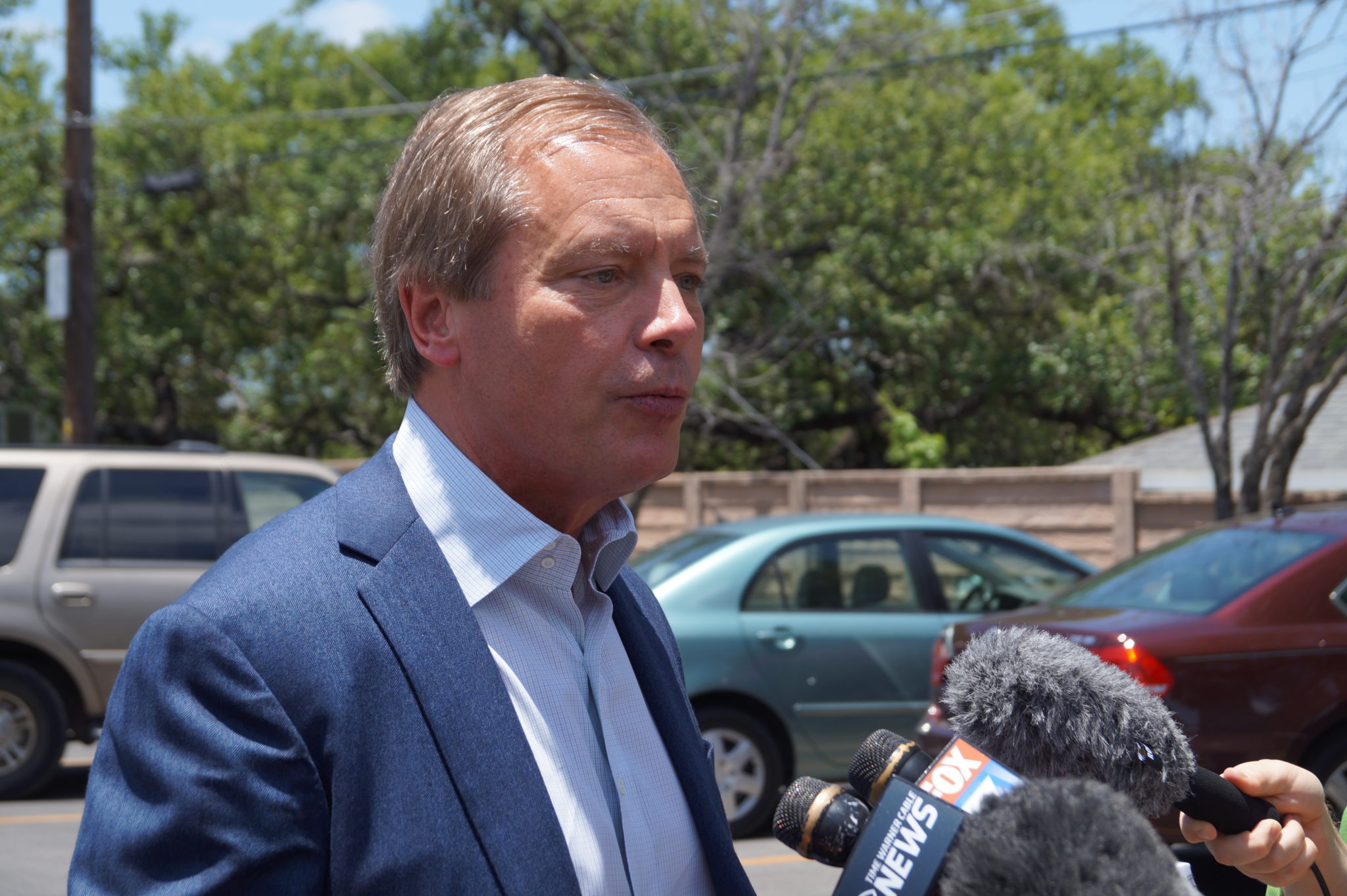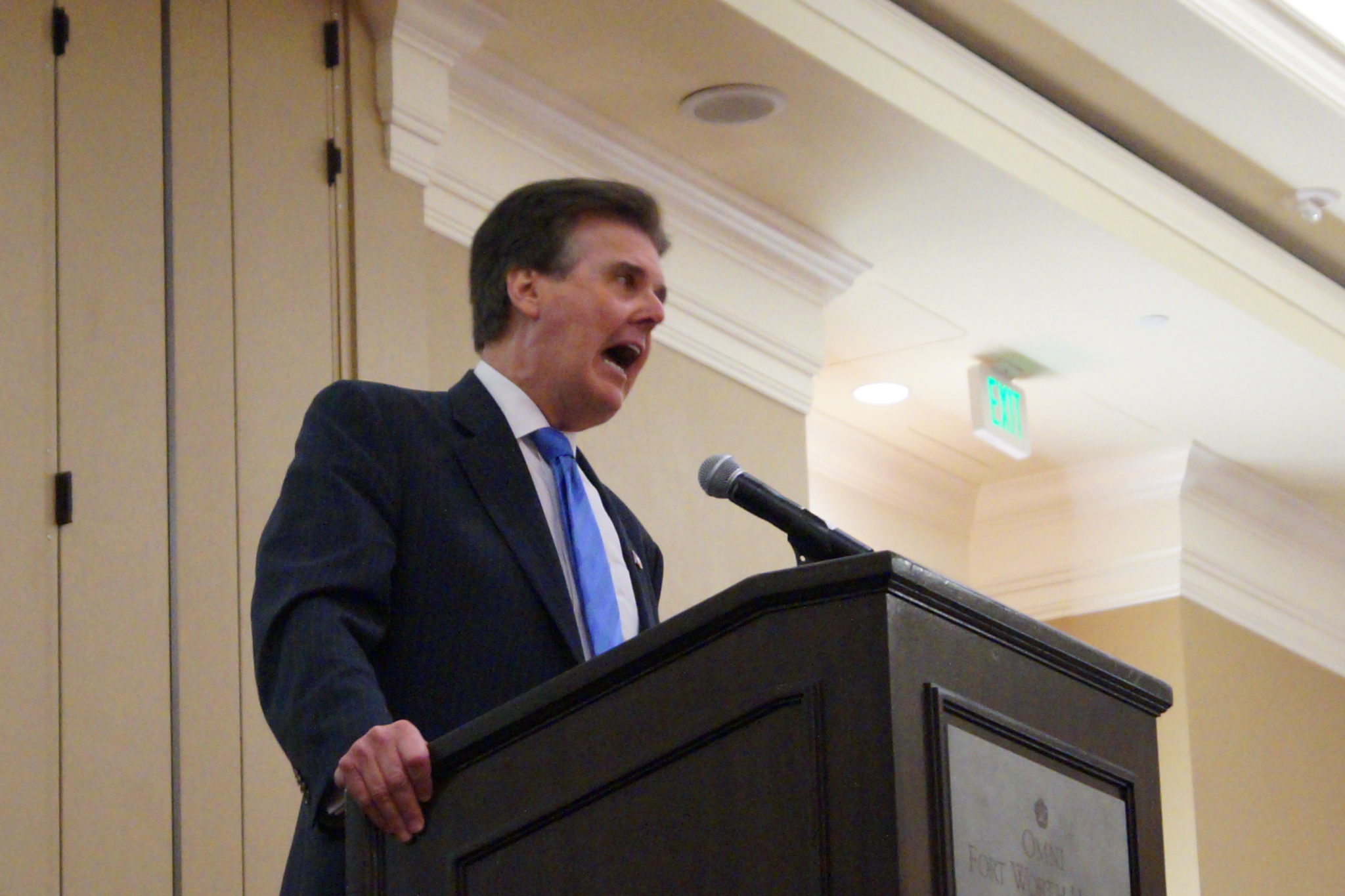
David Dewhurst and the Curious Case of the Mental Health Records
With early voting under way, David Dewhurst wants to capitalize on Dan Patrick’s mental health troubles while keeping his distance. That’ll be tricky.

Above: Lt. Gov. David Dewhurst speaks to reporters on the first day of early voting. May 19, 2014.
In the 1892 short story “Silver Blaze,” Sherlock Holmes spends much of his time on the question of what one dog didn’t do while a murder took place.
Gregory: “Is there any other point to which you would wish to draw my attention?”
Holmes: “To the curious incident of the dog in the night-time.”
Gregory: “The dog did nothing in the night-time.”
Holmes: “That was the curious incident.”
In the GOP’s increasingly cutthroat lieutenant governor primary, recent events have focused attention on another dirty nighttime deed—and the question of whether Lt. Gov. David Dewhurst barked.
News broke last Friday night of a bit of remarkably dirty campaigning by the Dewhurst campaign—or at the very least by its allies—and it’s not clear yet whether Dewhurst will benefit or suffer from the incident. That may depend on the veracity of Dewhurst’s denials of involvement in the release of Sen. Dan Patrick’s mental health records.
Last Thursday, Land Commissioner—and defeated lite guv candidate—Jerry Patterson continued his frenzied campaign to destroy Patrick by sending the press documents that detailed Patrick’s treatment for depression in the 1980s. The documents were linked to a 1987 lawsuit in which Patrick sued a Houston Post gossip columnist for libel. As part of the lawsuit, Patrick gave a deposition about his past mental health treatment. The deposition is in the public record, but its mere emergence was enough to trouble some observers, who don’t see its relevance to a 2014 campaign.
But on Friday, Patterson doubled down in a pretty extreme way. Late in the day, he sent around a new raft of documents that detailed, in uncomfortable detail, a suicide attempt Patrick made in the 1980s—and included notes from his doctors during treatment. Some media outlets declined to report the new information, but Quorum Report summarized the new information and released it around 9 p.m. on Friday.
For many people, the release of 30-year-old medical records detailing a person’s suicide attempt is off-limits, even in the context of a campaign that has defied logic and decency in innumerable ways. Austin King, the president of the Texas Medical Association, called it a “moral issue” that should be “out of bounds.” So the question naturally became: Was Dewhurst involved?
Dewhurst says no. “Neither I nor my campaign had anything to do with the discovery of those documents,” Dewhurst said Monday at a press conference in South Austin, “nor did we have anything to do with the release.”
The basic elements of this may be true—Patterson may have found the documents, and may have released them of his own accord. But Dewhurst’s efforts to distance himself from the release are complicated by a couple of strange elements in his narrative. One is his steadfast insistence that he still doesn’t know what’s in them, and never did. Here’s a more complete version of Dewhurst’s account of his interactions with Patterson, given Monday at the same press conference:
About a week and a half ago, two weeks ago, Jerry Patterson called one day out of the blue, started talking about a lawsuit, files, I said, woah woah woah, what are you talking about. And he said, well, I’m not sure. I don’t know what’s there. And I said, I don’t want any part of it, Jerry, I’m staying away from it. You should stay away from it. I don’t want anything to do with this. And then, apparently, last Thursday, he started sending out the files.
Think about that: Patterson, who has become a top Dewhurst lieutenant—someone who’s cutting ads for Dew’s campaign—comes to Dewhurst. Patterson says, I have something that could really hurt Patrick. In the middle of one of the most negative campaigns in memory, Dewhurst is totally incurious about this find. Not only does he not find out what’s in the papers Patterson has in his possession, but Patterson doesn’t know either, apparently. Yet despite not knowing what’s in Patterson’s papers, Dewhurst cuts him off. He’s sure that it shouldn’t be used. He ends the conversation.
Dewhurst continues to insist he doesn’t know what’s in the papers. “I don’t know what’s in the files except for what reporters tell me,” Dewhurst said on Waco Tea Party Radio Sunday night. By Monday, he still hadn’t bothered to look into the issue: “All I’ve read is what’s been on the Quorum Report and what people have told me.”
Is it plausible that in the middle of a sprawling, year-long, multi-million dollar statewide campaign largely premised on issues of character, that Dewhurst’s campaign, which has surely studied every aspect of Patrick’s personal history, was unaware of this 1987 lawsuit, and the public depositions it contained? Patrick sued the press for more than a million dollars, and that fact was widely reported. It appeared in one of the earliest Patrick profiles, a 2007 Texas Monthly article. Did this not merit some further inquiry from Dewhurst opposition researchers?
What’s more, we know Dewhurst was, on some level, involved in discussions about Patterson’s leak. The Texas Tribune reported Friday that Patterson accidentally sent an email to much of the Texas political press corps—and a Dewhurst campaign aide—that acknowledged those discussions:
“David has a great idea, but we could’ve only done it if we had this stuff a week ago,” Patterson continued. “Don’t let Daivids [sic] indecision snatch defeat from the jaws of victory. Patrick is playing the victim well. He says it was a minor bout of depression and he went in for a few days of rest. This will blow his story away.”
Strangely, Dewhurst continues to offer a partial defense of Patterson’s release of the documents. On Monday, he corrected reporters who called the documents “leaked” several times. They were in the public record, Dewhurst said. Actually, Patrick was to blame for the fact that they were public—by virtue of filing his 1987 lawsuit.
“At the end of the day, [making his mental treatment public] was Dan’s decision,” Dewhurst told Waco Tea Party Radio on Sunday. “He sued someone and claimed mental damage. He knew that was the law.” On Monday, he told reporters that “these were made public because of the actions of Dan Patrick,” who had been filing frivolous lawsuits and expecting a “windfall.”
But perhaps the strongest impediment to Dewhurst’s attempts to distance himself from Patterson’s release is his awkward attempts to capitalize on them. At his Monday press conference, reporters repeatedly asked Dewhurst to condemn Patterson’s release, as a number of Republican state senators have. He wouldn’t say that the revelations mattered, but he wouldn’t say that they didn’t, either.
“At the end of the day, if this speaks to the character and the capacity to govern and lead of Dan Patrick, then I think it should be on the voters minds,” Dewhurst said. “If it doesn’t, then it shouldn’t.”
For some time, Dewhurst has criticized Patrick’s “temperament” and “capacity to lead.” Those are old criticisms, but now it’s hard not to wonder if they’re being used as dog whistles. Especially when Dewhurst uses lines like this: “I made a point to reach out and share my prayers with the Patrick family. I don’t think what happened 20 years ago is relevant today. Unless, unless, it speaks to your continuing character, or your capacity to govern or lead.”
At Monday’s press conference, the questions from reporters got more and more pointed, as the press attempted to draw Dew out. Had Dewhurst ever seen evidence that Patrick was mentally unwell? A pause.
“The Dan Patrick I know, I wish him all the best in life,” Dewhurst replied, before continuing. “I’ve got the temperament, the integrity” to be lieutenant governor, he said.
As early voting begins, Dewhurst has settled on a new refrain. “At the end of the day there’s a responsibility for people to ask questions, ‘Who’s David Dewhurst, and who’s Dan Patrick?’” Both questions are becoming increasingly difficult to answer.


